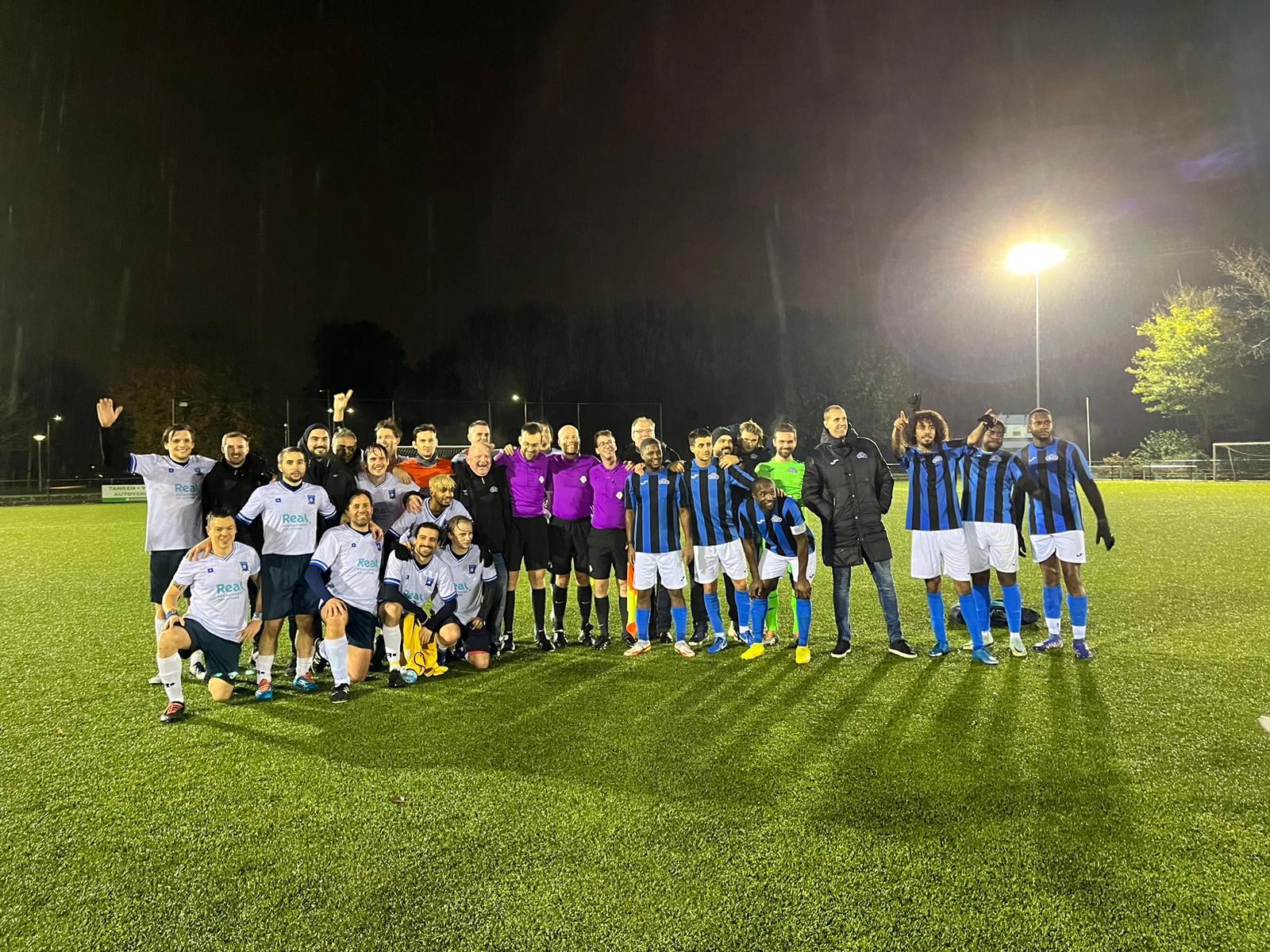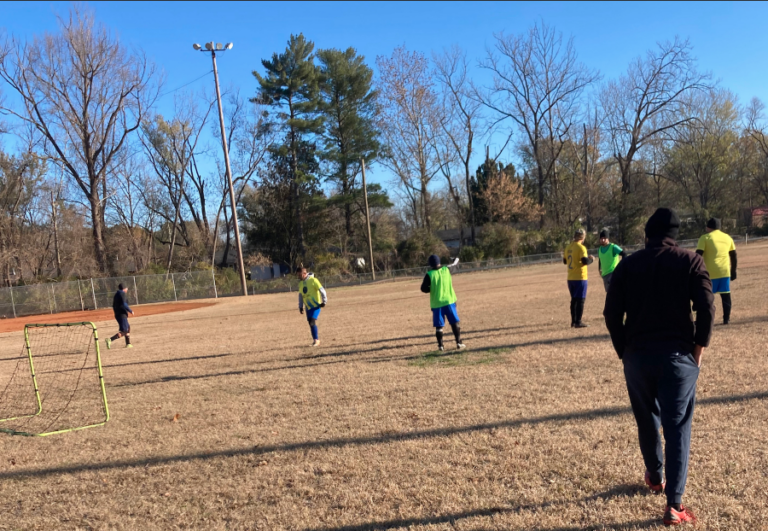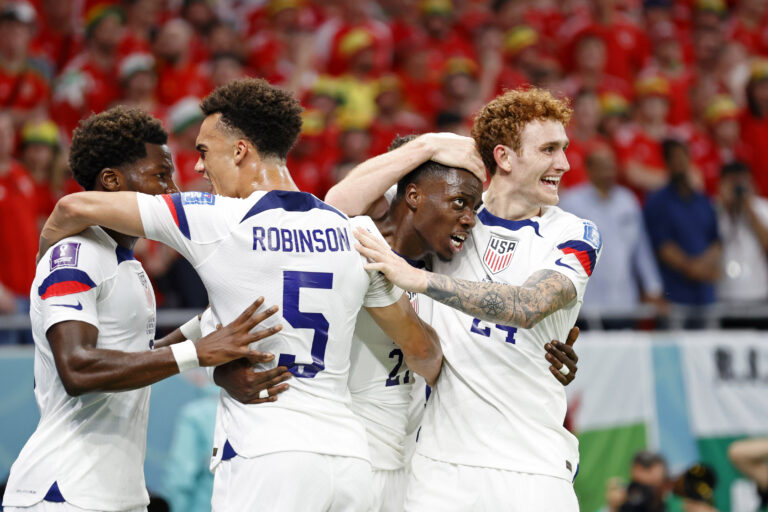The Anarchism, Community, and ‘Good, Positive Feelings’ of the FENIX Trophy
Why this matters
While the world's best men's national teams compete for a World Cup in Qatar and Europe's best clubs soon begin the knockout round of the UEFA Champions League, smaller community clubs around Europe have banded together to form a tournament that brings together what they believe matters most in football: camaraderie, passion and the night out on the town post-match.
On a video call from Milan, as he is ambling around lovely streets looking down at his phone, Leo Aleotti tells me, “Let me find an environment where I can speak out loud, as any Italian would do.” Aleotti, 27, is the creator of the FENIX Trophy, a scrappy, subversive little football tournament for grassroots and alternative European soccer clubs. Now in its second year, the FENIX Trophy doubles as a cheeky protest against the worship of money in modern football and the systemic greed and corruption that brought the 2022 World Cup to Qatar.
The name of the tournament is inspired by the term “phoenix club,” which denotes a club created by a community, often to revive a beloved team that has been bankrupted or ruined by reckless owners. The inaugural champion was FC United of Manchester, a club created in 2005 in direct response to the takeover of Manchester United by the Florida-based Glazer family, who have become infamous for failing to build winning teams while adding to their own personal fortunes by paying themselves shareholder dividends. While many Manchester United fans begrudgingly continued to give the Glazers money, FC United fought for an alternative path.
The rebellious energy behind FC United is reflected in the other FENIX clubs, too. They believe another way is possible. As Robin Beck, a representative for the fan-owned Belgium club KSK Beveren, told me, “I sincerely hope the system of football will implode.”
To understand the story of the FENIX Trophy, you have to go back to 2000, when Aleotti was 5. That year, Aleotti’s father, Alessandro, founded a football club. He called it Brera FC and he billed it “third club of Milan” after the powerhouses AC Milan and Inter Milan. The audacious move won the club loads of media attention, but not so much on-the-pitch success. “My father, he realized how expensive Italian football is,” Aleotti says. “So we started experimenting.”
In 2003, Brera founded a sister club, FreeOpera, inside a massive prison, Carcere di Opera, that competed in the official Italian football pyramid, in the ninth and lowest level, with opposing teams coming into the prison for games. Brera had to get sign-offs not just from the Italian Football Association but from multiple Italian government agencies. That year, FreeOpera won the league.
“It took a lot of work to put together, but not so much in the scouting,” Aleotti cracks. “The players, they were pretty much there.”
In 2013, in a move that would have made Allen Iverson proud, Brera FC canceled all their practices for the season to focus purely on game days. Their motto that season was “Mai un allenamento, solo il talento” — “Never a training, only the talent.”
“We wanted to become an alternative in terms of mindset," Aleotti says. Brera FC, he adds, is “a little bit of a philosophical concept.”
Which brings us to November 2020. As Milan suffered through a second surge in the COVID-19 pandemic, all football activity stopped, and Leo and his father sat around dreaming. “Aside from the money, what is the difference between us and Inter and AC Milan?” they asked each other. “We have players from all over the world. We have good communications. We have a very nice team. And we thought — European football.”
The Aleottis knew Brera could never play in the Champions League, the behemoth pan-European tournament that practically mints money by courting a parade of sponsors. So they “started imagining a concept that could put us in a European tournament.”
They started doing research. “We did a dossier on football in every country,” Aleotti says. They reached out to “journalists, bloggers, whatever” to try and find more clubs of their ilk in Spain, England, and the Netherlands. Largely through word of mouth, they found clubs similar to themselves: small with dedicated followings, solid social media followings, and lots of ambition. Clubs that have tiny budgets cobbled together from small sponsorships, ticketing and merchandise sales, and fan support.
They built out a list for their inaugural tournament and started laying down the logistics.
Aleotti applied for a grant from the EU’s culture-supporting Erasmus+ program, and while the clubs waited to see if the money would come in, they plotted. “I remember we had a Zoom meeting where I explained it: We can wait and do nothing or we work on creating alternative sources of revenue,” he says, meaning sponsorships or more grants. “Everybody was so hyped they wanted to do it anyway.” That Erasmus+ funding never did come in, but the tournament, even in the midst of a lingering pandemic, did happen. The clubs scraped it together the way they scrape together all of their operations. Since the players and staff are for the most part unpaid, all teams had to do was cobble together a travel budget via budget airlines. Home teams helped the away teams find affordable lodging and good, cheap dining.
The FENIX Trophy has since expanded from eight to nine clubs for the 2022-23 edition of the tournament. Along with the aforementioned Manchester, Milan, and Beveveren, the FENIX Trophy also consists of clubs in Prague, Belgrade, Valencia, Krakow, Copenhagen, and Amsterdam. Just like the Champions League, teams play home and away games on each other’s fields. Group matches kicked off in November, just before the World Cup.
FENIX Trophy clubs all share a passion for DIY footballing, but they took very different paths to the tournament. BK Skjold is a member-owned club that plays in the heart of Copenhagen and originated in 1915. “We aim to be a club which has value for the local community,” Skjold chairman Jan Sorensen tells me. To that end, beyond their main men’s team, they operate sister teams for a wide range of demographics, like women with breast cancer and overweight men in their 50s. A few years ago, the father of one of the players from the men's team quit his longtime job as an accountant to bake bread for the club in the team kitchen. His lark turned into Galst, now a beloved Copenhagen bakery. Adds Sorensen: “Tomorrow, we have an opening of a new contemporary art exhibition in the dressing room!”
Club members vote on the budget and elect the board and the chairman and generally have a say in anything the club might get into. “If they have a good idea, go on, let’s try it,” Sorensen says. “Let’s see if it’s a good idea or if it was only an idea that was good in the head.”
The Krakow Dragoons were founded in 2015, a decade after BK Skjold. The club started when Alex Băcica, an IT specialist who moved to Poland from Romania, reached out to a Facebook group for expats new to the country looking for guys to play pick-up football with. A core group of weekly players kept growing and growing, and then the group started dreaming. They decided to go legit as an expat team and to join Poland’s official football pyramid. “We all chipped in some money, and we went to a sports store and bought 15 identical T-shirts,” Băcica says, smiling. Seven years later, they’re indeed playing in the Poland pyramid (in the second league from the bottom) and overseas in Amsterdam in the FENIX Trophy.
The Dragoons have been represented by players from more than 26 countries. They’re working toward becoming fan-owned, which would mean that ownership would be open to all and split among dues-paying members. The Dragoons just need to work on getting some more fans first. Băcica says they can count on 30 to 40 a game, “which is 30 to 40 more than we had three years ago.”
According to Băcica, the team thinks of itself less as a political project and more as “a social platform.”
“Pretty much everyone that’s at the club has a similar story: They came here for work and didn’t know anyone. Maybe they didn’t know the language." Băcica says. "And this is our common ground. You love football, and there you have it. You’re gonna join the club, and you’re gonna build friendships. And now, to be able to travel to Amsterdam to play, to have the game stream on TV, to have people that we don’t know from other countries ask us about buying shirts — that’s football.”
Related: How Soccer Fans Are Rebelling Against Unchecked Global Capitalism
In Prague, the Raptors also operate as a largely expat team. The idea for the club began in 2017, says Raptors founder Daz Moss, “when I was back visiting my mum in Yorkshire, England, with my family. I was watching football on the TV with my boy, Lukas, who was 5 at the time, and he asked, 'Why don’t we make a football team?’” Like the National Basketball Association’s Toronto Raptors, the Prague Raptors were named after Jurassic Park. (It’s Lukas’s favorite movie.) “We held our first trials in March 2018 and had over 70 players turn up, which meant we quickly pulled together a team and entered the league that season in the ninth division.” Now, the senior Raptors team plays in the sixth division and the women’s team plays in the third.
Counting staff and players, the Raptors have represented more than 50 countries. “Our aim is to not only climb the leagues but also to use football to help drive positivity and promote diversity,” Moss says. “In the next few years, we want to have official academy teams in all age groups.” They also have developed a friendly relationship with a Nigerian women’s team, Bravehearts, and have supported their mission to create more sporting opportunities for women in Nigeria. The Raptors have provided funding for equipment, and are hoping to travel to Nigeria to meet Bravehearts in person.
As for FENIX, Moss says, the tournament is “only partly about what happens on the pitch. The whole comraderie between the teams is way more important than those 90 minutes.” After the first iteration of FENIX, the Raptors “made friends for life" with their opponents from the Netherlands and Poland.
Belgium’s KSK Beveren formed as a phoenix club in 2010, after its original incarnation merged with another local club. For Robin Beck, the Beveren spokesperson, the FENIX Trophy is a showcase for international solidarity. “It’s very important to stick together because there’s not a lot of clubs [like KSH Beveren]," Beck says.
“It’s nice to share our values, our experiences, because it’s a tough battle,” Beck says. “The last few years have shown even more that football is all about commercialization. Being fan-owned isn’t easy. I can understand that it’s not for every club. But I do think every single football club in the world should have more transparency and more influence from fans.”
When asked to participate in the FENIX Trophy, “the only thing that we were worried about is the costs of travel,” Beck says. “We just want to break even, and that’s going to happen. And it’s not about making money; it’s about making friends.” Membership in KSK Beveren for fans is 35 euros a year, and, after one year, they get voting rights. There are about 120 dues-paying members. "People imagine a guy with a scarf singing or drinking and think, ‘How can a fan run a football club?’” Beck says. “Actually, it’s quite possible.”
Beck says that KSK Beveren sometimes plays on potato fields in front of just 200 or 300 people. “A lot of people don’t get it. ‘Why are you watching players that can’t play football, in a potato field, singing in the rain?’" Beck says. “But the feeling that you have with the fans that think just like you and are there just for their club — that’s one of the best feelings that you can have.”
****
After Brera’s first 2022 FENIX game against FK Miljakovac in the Stadion Shopping Center, on top of a mall in Belgrade, I reached out to Aleotti again. But, uncharacteristically for the loquacious fellow, I didn’t get an answer. “Sorry for the late reply,” he finally texts me. “Had to avert a diplomatic crisis.”
It turned out that one of Brera’s players was born in Armenia but had fled the country for Italy and no longer had citizenship. He’d been granted an Italian police document certifying his legal status in Italy, but Serbia wouldn’t allow him to enter on that document, and so he was detained for nearly 30 hours while Brera went on to play — and win 5-3. The high goals total is part of a trend in the FENIX group stage this year. “A total of 23 goals scored,” @FENIXTrophy tweeted recently. “Why even bother watching the World Cup?”
Despite the border kerfuffle, Aleotti had a great time. “Belgrade reignited my sensations,” he says. At the FENIX away games he feels like a celebrity. He says that during the first FENIX Trophy, at a game in Poland that Brera won 2-1, “everybody from the stands was greeting me. You feel really connected to the whole environment rather than just a game.”
The FENIX Trophy group games wrap up before the end of 2022, and the knockout games will begin early next year. But already, Aoletti says, “At the moment we should work on expanding the tournament.” Aleotti said the inaugural FENIX Trophy was a newborn child that knew nothing. "Now, the child is walking.”
Some might roll their eyes at the FENIX Trophy and say why not just support the same mega-clubs everyone else does? That’s where the best players play! But outside of the United States, there’s already a genuine appreciation for lower-level clubs organically connected to their local communities. In London, you can walk into a corner store to buy any number of national newspapers along with The Non-League Football Paper, a broadsheet dedicated to the football action far, far below the Premier League.
Related: English Soccer Wrestles with Saudi Takeover of Newcastle
Meanwhile, every day brings more depressing headlines about how football is being hyper-commercialized. Recently, the Glazer family announced they are exploring a possible sale of Manchester United. A deal like that could be seen as a vindication for fan activism within the top tier of the sport. But as The Guardian’s Barney Ronay recently pointed out, Liverpool, owned by the Fenway Sport Group, is also exploring a sale. “The two most valuable privately owned properties in English football are put up for sale within a month of one another,” Ronay wrote. “The key U.S. billionaires, boarding group one, are cashing out simultaneously. This is significant enough as a standalone event. But there are no coincidences. And, as ever, always follow the money.” Ultimately the reason the Glazers are selling may not have anything to do with the protests. More likely, their financial advisors have informed them that this is an optimal time for a return on investment.
Over at the FENIX Trophy, though, you don’t have to twist yourself into contortions to figure out how to ethically consume the product. No one is doing anything for the money. Because there is no real money to be made. For the clubs participating in the FENIX Trophy, breaking even would be a win.
In Italy, Aleotti says, the Brera project has often been misunderstood. The club hasn't been particularly successful on the pitch; after all these years, they’re currently playing in the eighth division of Italian football. He says it's the relationships that formed, the direct communication between fans and players, that make the club make sense. If modern football has left both the consumers and the athletes feeling like cogs in a ruthless profit-generating machine, FENIX wants to remind us that there is a way to enjoy the sport without feeling morally compromised. “Non-professional football should be done out of passion, out of pleasure for the game, out of enjoyment,” he says. “Out of fun and good, positive feelings and vibes.”
Win or lose, Brera always invites their competition to have a few beers. In the domestic league, the offer is sometimes received with suspicion; sometimes, opponents who think they are supposed to imitate the professionalism of Inter or AC Milan “go straight, like horses, as if we were offering them ecstasy or cocaine.” But in Belgrade, once they climbed down off the roof of the Stadion Shopping Center, everyone lifted a glass. Aleotti texted me a photo of Brera FC and FK Miljakovac all crowded together in a Belgrade bar, grinning, drinks in hand. “The most important part of the FENIX Trophy,” he wrote. “The night out.”
Monthly Issue
The World of Football
The Qatar World Cup looks destined to be a debacle, from the scheduling for teams and athletes to the human rights abuses around workers at the event, to the logistics and after-effects of holding the event itself.
At the same time, soccer is changing like all sports – becoming more cross-pollenated between cultures and nations, maneuvering through a massive influx of cash, and modernizing on and off the pitch.
We offer a look at the state of world football through the lens of the 2022 FIFA World Cup.




